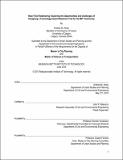| dc.contributor.advisor | John P. Attanucci. | en_US |
| dc.contributor.author | Amey, Andrew M | en_US |
| dc.contributor.other | Massachusetts Institute of Technology. Dept. of Urban Studies and Planning. | en_US |
| dc.date.accessioned | 2011-03-07T15:15:36Z | |
| dc.date.available | 2011-03-07T15:15:36Z | |
| dc.date.copyright | 2010 | en_US |
| dc.date.issued | 2010 | en_US |
| dc.identifier.uri | http://hdl.handle.net/1721.1/61563 | |
| dc.description | Thesis (S.M. in Transportation)--Massachusetts Institute of Technology, Dept. of Civil and Environmental Engineering; and, (M.C.P.)--Massachusetts Institute of Technology, Dept. of Urban Studies and Planning, 2010. | en_US |
| dc.description | Cataloged from PDF version of thesis. | en_US |
| dc.description | Includes bibliographical references (p. 181-188). | en_US |
| dc.description.abstract | The potential benefits from increased ridesharing are substantial, and impact a wide range of stakeholders. In a properly applied rideshare scheme, drivers and passengers achieve cost savings, they potentially achieve travel time savings, and they benefit from increased travel options. Employers can reduce expensive parking construction or leasing, and benefit from higher worker productivity. Society benefits from congestion reduction, energy security improvements, greenhouse gas (GHG) emission reductions and increased social equity. Unfortunately, ridesharing's historical success has been rather modest, with a substantial decrease in popularity since the 1970's and participation that remains near an all-time low. Clearly there is a disconnect between the purported benefits and the real or perceived challenges associated with sharing rides. This thesis asks why ridesharing is not more popular than current participation suggests, and what can be done to encourage greater participation going forward? After a review of past and present rideshare initiatives, it becomes clear that there is no single challenge to be overcome that will increase interest and participation in ridesharing. Rather, the 'rideshare challenge' is a series of economic, behavioral, institutional and technological obstacles to be addressed. Yet, two opportunities show particular promise at helping overcome these challenges - a focus on large employers, and a technology-based service innovation known as "real-time" ridesharing. Large employers are a unique type of institution that can successfully influence private household travel decisions while simultaneously advancing employer-specific goals and various societal goals. "Real-time" ridesharing extends the range of existing rideshare options available to travelers and it begins to address a number of challenges associated with ridesharing. To increase rideshare participation going forward, this thesis proposes a detailed design for an employer based, technology-focused rideshare trial for the Massachusetts Institute of Technology (MIT), supported by a rigorous, Institute-specific analysis of rideshare viability. The trial is designed to be expanded to other institutions in the MIT/Kendall Square area of Cambridge, MA in the future. The analysis suggests that on an ideal day, approximately 65% of consistent, single occupant commuters could share rides, leading to a 19% reduction in Institute-wide, commuting trip VMT. The trial design focuses on the use of technology, incentives and personalized marketing to overcome the 'rideshare challenge' and realize a significant portion of this best case VMT reduction. | en_US |
| dc.description.statementofresponsibility | by Andrew M. Amey. | en_US |
| dc.format.extent | 189 p. | en_US |
| dc.language.iso | eng | en_US |
| dc.publisher | Massachusetts Institute of Technology | en_US |
| dc.rights | M.I.T. theses are protected by
copyright. They may be viewed from this source for any purpose, but
reproduction or distribution in any format is prohibited without written
permission. See provided URL for inquiries about permission. | en_US |
| dc.rights.uri | http://dspace.mit.edu/handle/1721.1/7582 | en_US |
| dc.subject | Civil and Environmental Engineering. | en_US |
| dc.subject | Urban Studies and Planning. | en_US |
| dc.title | Real-time ridesharing : exploring the opportunities and challenges of designing a technology-based rideshare trial for the MIT community | en_US |
| dc.type | Thesis | en_US |
| dc.description.degree | M.C.P. | en_US |
| dc.description.degree | S.M.in Transportation | en_US |
| dc.contributor.department | Massachusetts Institute of Technology. Department of Civil and Environmental Engineering | |
| dc.contributor.department | Massachusetts Institute of Technology. Department of Urban Studies and Planning | |
| dc.identifier.oclc | 703219607 | en_US |
